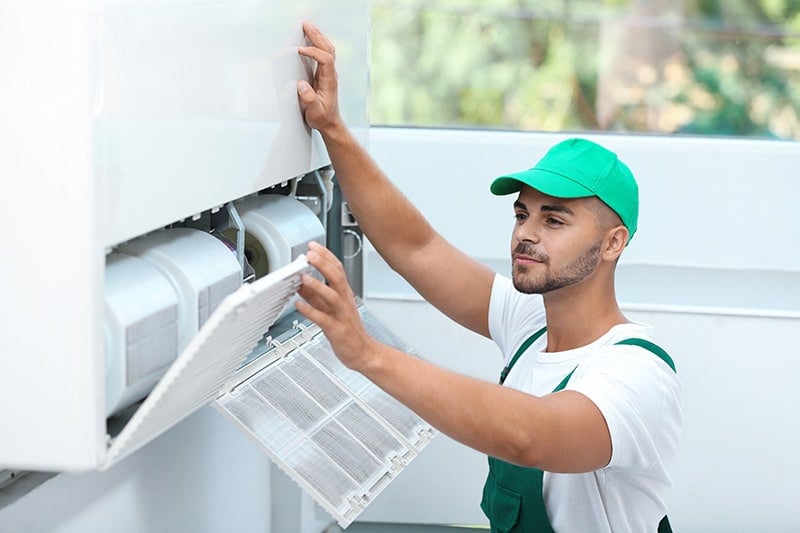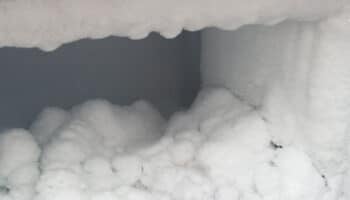We've independently reviewed this article to make sure it's as accurate as we can make it.
To find out more about our article creation and review process, check out our editorial guidelines.
Does your fridge smell like gas?
I know how concerning a gas smell can be, especially when you don’t know where it’s coming from.
But don’t worry; I’m here to help!
If you smell or hear gas from your fridge, the freezer is probably in defrost mode, which is completely normal. However, if the issue persists and your food is warm, there’s a good chance you have a refrigerant leak.
Keep reading to learn how to solve the issue!
Why trust us? This article was written by Craig Anderson and Andy Fulenchek.
Craig has helped thousands of other homeowners repair their appliances since 2016.
Andy is one of our resident appliance repair experts with over a decade of experience. He currently runs his appliance repair company with a team of trusted technicians.
Reasons Why You Smell Or Hear Gas From Your Fridge
In this section, I’ll guide you through the different reasons you smell or hear gas from your fridge and provide various solutions.
Are you ready? Let’s dive in!
#1 Freezer Is in Defrost Mode
Hearing or smelling gas from your fridge can be quite alarming.
But what if I told you that you’re probably confusing a gas leak with the defrost mode?
Let me explain: Frost can accumulate around your fridge’s evaporator coil, blocking airflow and causing your appliance to work harder to stay cool. So, most modern refrigerators have an auto-defrost function that melts the frost from the evaporator coils using a heating element, which can create a hissing sound as the ice melts and drips. A fridge gas leak can produce a similar sound.
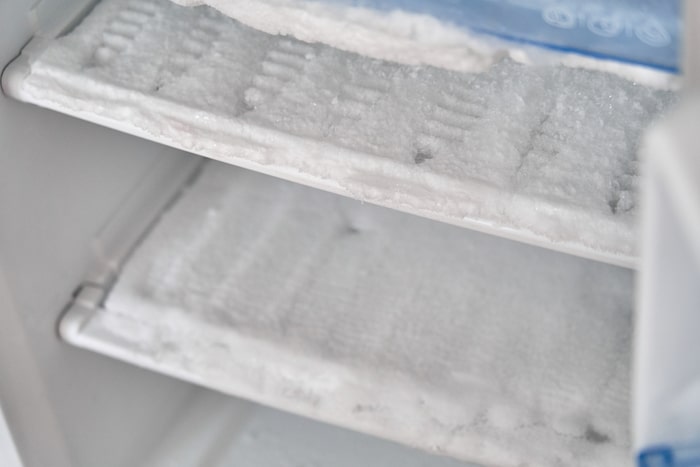
The easiest way to confirm that the sound comes from the defrost mode is by waiting for 20 or 40 minutes or until the defrost cycle has finished.
If you can’t hear the noise anymore, then there’s your answer: the hissing sound is part of normal operation.
But, if you still hear gas from your fridge and your food is not cold anymore, you probably have a refrigerant leak.
Keep reading to learn more!
#2 You Have a Refrigerant Leak
If your fridge or freezer smells like gas, you probably have a refrigerant leak.
Your fridge’s refrigerant is a gas that can transform into a liquid (and vice-versa). It is pushed through the coils to interact with the surrounding environment and keep your appliance cool.
I tend to find that refrigerant leaks are mostly caused by people accidentally puncturing a line trying to chip off the ice from the evaporator. So, you must be careful when defrosting your fridge or moving it.
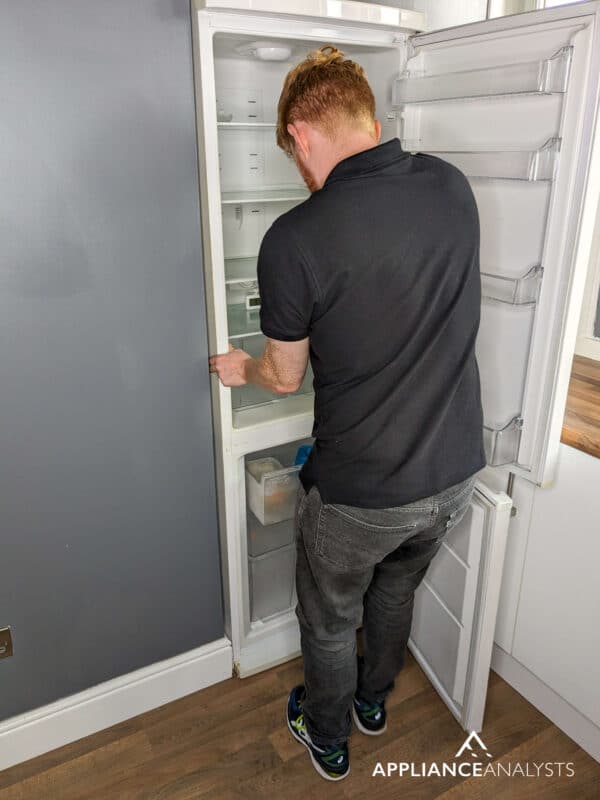
Traditional refrigerants are typically odorless, so you wouldn’t normally smell a leak. However, some newer fridges use an R600 refrigerant that does have a distinct smell.
It’s worth noting that fridges typically use only 2-3 ounces of refrigerant, so a leak can easily go unnoticed by smell, especially if you’re away from the appliance. So, here are other five common signs of a fridge gas leak:
- Spoiled food: As mentioned before, the refrigerant is in charge of keeping your fridge cool. Unfortunately, your fridge won’t keep your food fresh if you have a leak.
- Higher electricity bill: A refrigerant or “Freon” leak will cause your fridge’s motor to run non-stop, increasing your electricity bills. (“Freon” is a popular refrigerant brand name)
- Sickness: Unfortunately, if you’ve been exposed to a refrigerant leak for a long time, you can feel nauseous or dizzy. Other symptoms include headache, itchy eyes, and shortness of breath. In severe cases, refrigerant can cause arrhythmia. Please call your doctor if you have any of the symptoms above.
- Smell: Your fridge can smell like gas or chemicals due to a refrigerant leak. Some people describe the smell as nail polish.
- Oil residue on the floor: If you have a refrigerant leak, you’ll notice an oil residue on your floor. This substance is not refrigerant (refrigerant is a gas) but a byproduct.
If you notice a fridge gas leak smell or any of the signs above, you’ll need to find the refrigerant leak.
You can easily detect a refrigerant leak by visually inspecting and checking for oil residue on the floor. Normally, oil residue is under the leakage spot.
You can also mix dish soap and water in a spray bottle and spray it on the tubing. When refrigerant escapes the leak, it will create bubbles.
Bear in mind that the best way to detect a refrigerant leak is by calling a professional.
You see, refrigerants can be harmful to your health, and sometimes the detection process can be complicated. Professionals use different tools to detect a leak.
For example, they can use an electronic leak detector, which is the most accurate way to check for leaks. They can also use a fluorescent leak detector, which will give off a bright yellow or green light under UV light on the leak spots.
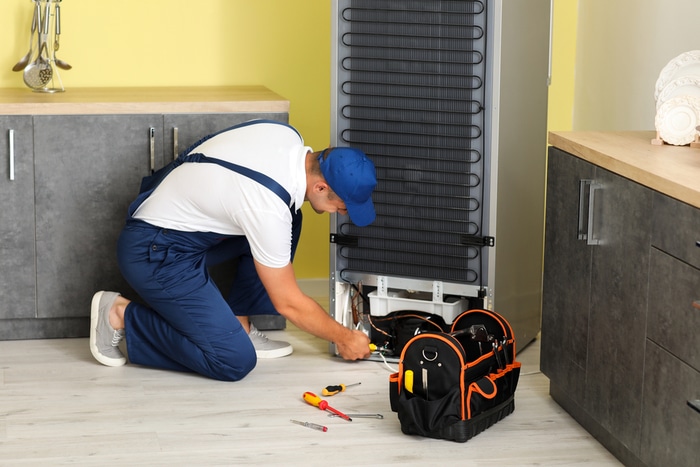
Bear in mind that repairing a refrigerant leak can cost over $600, as it will probably require replacing the evaporator.
Note: The repair price can vary depending on your specific fridge. You can find your fridge’s model number on a label inside the appliance, door, sides, or back.
Please talk to a professional and ask for the exact cost (take into consideration your warranty). If it’s very expensive, I recommend buying a new fridge.
I know buying a new fridge is the last thing you want to hear, but you’ll probably find comfort knowing that refrigerators are usually on sale in May, September, and October. And stores like Best Buy have sales on Cyber Monday, Black Friday, Fourth of July, or Memorial Day.
If you can’t afford to buy a fridge from a gadget store, you can check Facebook and Craigslist. There’s always someone looking to get rid of their fridge because they’re renovating their kitchens. You can also call your local big-box stores and ask if they have any display models for sale.
Tip: If you want to buy a new refrigerator but are still saving money, I recommend using a mini-fridge or prep a fridge-free meal plan.
How to Check if Your Fridge Is Under Warranty
When repairing a fridge gas smell or sound, you’ll need to check if your appliance is still under warranty since most manufacturers cover repairs or replacements.
Normally, refrigerator warranties are valid for one or two years from the original purchase date, but they can vary depending on the fridge you own.
When you bought your fridge, you received some documents. You will need to check them to see your fridge’s warranty.
If you can’t find the warranty documents, don’t worry. You can enter the manufacturer’s website to verify the warranty length.
For example, if you have an LG fridge, you’ll just have to go to Google and search for “LG Fridge Warranty Information” or enter lg.com/us/support/warranty-information.
You can also contact the retailer; they normally save customer transaction details.
Dealing with Fridge Gas Smell or Sound
Hopefully, now you know how to fix the gas smell or sound from your fridge.
Remember that if you hear gas from your fridge, chances are water is dropping into the defroster heaters. The hissing noise can be easily confused with gas coming from your appliance.
But don’t forget that if your refrigerator smells like gas and your food is warm, you’re feeling sick, your electricity bills increased, or you have oil residue on the floor, there’s a good chance you have a refrigerant leak.
You can make a visual inspection or use soapy water to detect the leak, but remember to call a professional, as the refrigerant can be harmful to your health.
Thank you so much for taking the time to read this article. If you ever experience a different issue while using your fridge, please check out our related posts below.
Have a wonderful rest of the day!

